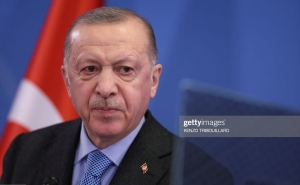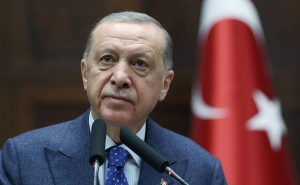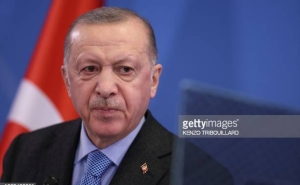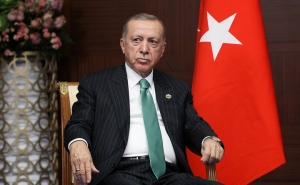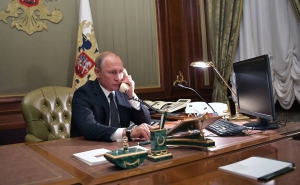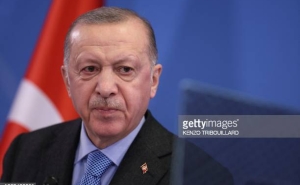Erdogan's Phenomenon or How to Avoid the International Sanctions
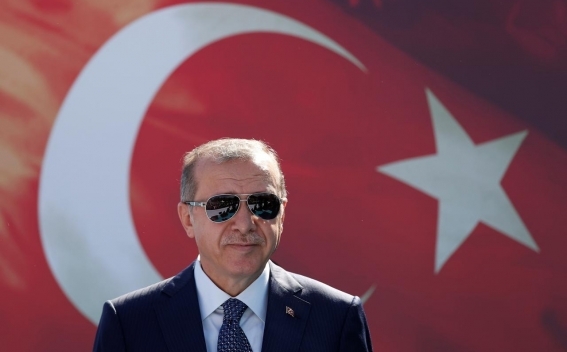
Turkey continues its military operation against Kurdish militants in Afrin, who are, by the way, the main allies of the US-led international coalition in the fight against terrorism in Syria. In such conditions, the reaction of the Western countries, and especially the US, to Turkey's actions, is very surprising. It should be noted that the toughest step undertaken by the West in response to Turkey's actions, was calling for an extraordinary session by the UN Security Council. The international community only expressed its concern and urged to stop the military actions against the Kurds.
Let's remind that this is not the first case in recent times when the international community fails to see Turkey's invasion of foreign territory.
In December 2015, Turkish troops entered Iraq to declare the Kurdish mercenaries. Despite numerous demands by Baghdad to withdraw troops from the country, Ankara continued its operation against the militants of the Kurdistan Workers' Party in the north of Iraq and withdrew its troops only after the coup attempt of July 2016. The actual invasion of a foreign country remained without a proper international reaction, the international community only called on Turkey several times to withdraw its troops. The response of the international community was the same as to the Turkish "Euphrates Shield" in northern Syria in the period from August 2016 to March 2017, which was not agreed with the internationally recognized Syrian authorities and actually invaded the territory of the neighboring country.
It should be noted that Turkish President Recep Tayip Erdogan's actions almost always remain outside the attention of the international community, while similar steps taken by other states get a very tough response, including long-term sanctions. Thus, the international community has a rather tolerant attitude towards the situation in Turkey.
Thus, from December 2015 to February 2016, Erdogan carried out large-scale military operations against the militants of the Kurdistan Workers' Party in the south-eastern Kurdish province of the country. Despite the numerous reports of gross violations of human rights during the anti-terrorist operation and the number of casualties among the civilian population, the international community did not take any action to conduct an adequate investigation in that direction. The Turkish authorities, in the southeastern part of the country, launched an unprecedented pressure on Kurdish political forces, thanks to Erdogan's constitutional amendment, and even arrested the Kurdish MPs, including the leader of the Kurdish opposition ''Democratic People's Party'', Salahattin Demirtas.
During the unsuccessful attempt of an armed coup in the country on July 16, 2016, the Turkish authorities arrested or fired tens of thousands of employees in the field of education, justice and security, suspected of being members of the Fethullah Gulen movement accused of coup d'etat. All this happens with gross violations of freedom of speech, mass media are closed, criminal cases are initiated against bloggers, censorship is carried out on the Internet, social networks are being regularly blocked. In addition, foreign journalists and human rights activists are also being harassed (German journalist from ''Die Welt'', Amnesty International human rights activists, etc.).
Only a year after these repressions, Western and European countries began to alert Erdogan's attempt to punish all his opponents. It should be noted that European countries also criticized Erdogan's constitutional amendments that imply an unprecedented expansion of his powers by referendum, saying that under the current situation in Turkey in the field of human rights, the country cannot claim to become an EU member. However, it should be noted that some European countries have also voiced that Turkey's European ambitions are unrealistic. Turkey has been trying to become an EU member for already 50 years.
German Chancellor Angela Merkel spoke about the need to impose sanctions against Turkey. It should be noted that the relations between the two countries over the past two years are in a rather strained condition. At the same time, Turkish relations are tense with a number of other European countries, such as Austria, Belgium, the Netherlands and others.
Nevertheless, European countries are not so quick to take practical steps against Erdogan. Moreover, Ankara is trying to punish European countries itself. In particular, as a result of this tension, Germany, which was a NATO member, had to withdraw its troops from the NATO Incirlik air base in Turkey. It was preceded by Erdogan's censorship in Europe. Erdogan's lawsuits against European journalists were partially satisfied.
What is the reason for such tolerance towards Erdogan? For European countries, this is first of all related to migration. In recent years, migration from the Middle East has become a real tragedy for the EU. In case of any careless movement by Europe, Erdogan threatens to cancel the migration deal and send to Europe about 3 million refugees. As it seems, this blackmail by Turkey as well as its regional policy is quite effective.
As for the US response, it should be noted that the protection of human rights and the level of democracy in Turkey has never been a priority in Washington for cooperation with that country. The United States is more interested in promoting its interests in the region than to democratize that country. As regards the US attitude towards Turkey's regional policy, the American response is that the actions against the Kurds in Iraq and Syria, or even the sinking of Russian airplanes in Syria, do not contradict American interests.
At the same time it should be noted that the use of double standards by the West leads to Erdogan's anarchy, which, as we see from the current state of relations with the West, contains risks for the western allies. Erdogan goes out of control and begins to ignore the allies. It will be difficult for the West to bring the Turkish president to the constructive field and will require substantial concessions or radical changes in their regional policies.
Other materials on this subject
- 2 dead, 2 injured after fire at lodging section of Armenian Catholic Church in Istanbul He said the firefighter-rescue team arrived immediately. Armenian Catholic Archeparch of Istanbul Archbishop Lévon Zékiyan was also on the scene.
- Turkey is sending Cold War-era cluster bombs to Ukraine – FP The weapons are designed to destroy tanks by bursting into smaller submunitions, which can linger on the battlefield for years if they do not immediately explode. Each round scatters about 88 bomblets.
- Fire erupts in Turkey’s Black Sea port of Samsun following explosion The causes for the explosion that led to a fire are currently being analyzed.
- EU Urges Turkey to Stop Offering Russia Solutions to Circumvent Sanctions Speaking about the EU's engagement with Turkey, an important neighbor, EU partner and candidate country for EU membership, we stress the importance of ensuring that Turkey's foreign policy is aligned with...
- Any Change of Internationally Recognized Borders in Region is Unacceptable – Iranian President to Erdogan "The basis of our policy in the region is that the fates of the countries must be determined by themselves and that their national sovereignty and territorial integrity must be respected" Raisi told Erdogan...
-
 17:08
17:08The regular session of the Anti-corruption Policy Council takes place in Jermuk
-
 15:05
15:05The Prime Minister sends congratulatory messages to the supreme leader of Iran and the President of Iran
-
 11:11
11:11Armenia sends earthquake aid to Turkey
-
 10:43
10:43Commemoration of the Pontiff St. Sahak Partev
-
 09:16
09:16Some roads are closed and difficult to pass in Armenia
-
 19:55
19:55Phone conversation of the Foreign Minister of Armenia with the U.S. Assistant Secretary of State for European and Eurasian Affairs
-
 18:30
18:30Prime Minister Pashinyan and President Khachaturyan meet
-
 18:20
18:20Ararat Mirzoyan with Co-Chairman of the OSCE Minsk Group of France Brice Roquefeuil
-
 17:01
17:01Humans could land on Mars within 10 years, Musk predicts
-
 16:45
16:45France, US urge 'immediate' end to Nagorno Karabakh blockade
-
 16:01
16:01Blockaded Nagorno Karabakh launches fundraiser to support quake-hit Syria
-
 15:59
15:59Earthquake death toll in Turkey rises to 18,342
-
 15:43
15:43Ararat Mirzoyan Held a Telephone Conversation with Sergey Lavrov
-
 15:06
15:06French president rules out fighter jet supplies to Ukraine in near future
-
 14:47
14:475 Day Weather Forecast in Armenia
-
 14:44
14:44President Vahagn Khachaturyan wrote a note in the book of condolences opened in the Embassy of Syria in Armenia
-
 14:20
14:20Azerbaijan’s provocations impede establishment of peace and stability – Armenian FM tells Russian Co-Chair of OSCE MG
-
 12:57
12:57France representation to OSCE: Paris calls on Azerbaijan to restore freedom of movement through Lachin corridor
-
 11:40
11:40Command of Kosovo forces highly appreciated preparation of Armenian peacekeepers
-
 10:16
10:16The United States withdrew from sanctions against Syria for six months the provision of assistance after the earthquake
day
week
month
Humidity: 20%
Wind: 2.06 km/h


